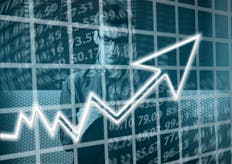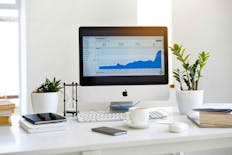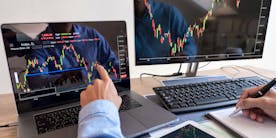Signs You Are a Great Trader: Top 20 in 2025
All products and services featured are independently selected by WikiJob. When you register or purchase through links on this page, we may earn a commission.
51% of retail investor accounts lose money when trading CFDs with eToro. You should consider whether you understand how CFDs work, and whether you can afford to take the high risk of losing your money.
- A list of the Top Trading Brokers for January 2025:
- Description of the Best Trading Brokers for January 2025
- What Makes a Great Trader?
- The Top 20 Signs You Are a Great Trader
empty
empty
empty
empty
empty
empty
empty
empty
empty
empty
empty
empty
empty
empty
empty
empty
empty
empty
empty
empty
- Frequently Asked Questions
- Final Thoughts
Have you been trading for a while but are unsure if you qualify as a great trader?
If this is the case, then you could be doing yourself a disservice.
There are many ways to determine whether you are a great trader (this article lists 20), so read on and see how many you can tick off.
You might surprise yourself.
A list of the Top Trading Brokers for January 2025:
Description of the Best Trading Brokers for January 2025
1. eToro
Pros
- Regulated by FCA, ASIC
- No withdrawal fee for US clients
- 0% commission on stocks
- Social and copy trading
Cons
- Not available in every US State
- More expensive than most of its competitors
- No MetaTrader platforms
Below content does not apply to US users
Founded in 2007, eToro is considered a very low-risk broker as it is highly regulated by the Financial Conduct Authority (FCA) in the UK and many other regulatory bodies elsewhere.
Opening an account is free and you can access a $100,000 demo account to test the system.
It offers 47 currency pairs for trading. Spreads for forex trading have recently been significantly reduced and range from a very competitive 1 to 3 pips for major currency pairs.
Typical spreads for EURUSD and USDJPY trades, for example, are just 1 pip.
You can see the full list of spreads on the eToro website.
You’ll need to deposit a minimum of $200 for Copy Trading, eToro's standout feature which allows you to follow other traders and copy their trades.
This forex broker is great for beginners due to its user-friendly interface and app and 24-hour customer support. It allows you to trade currencies, stocks and cryptocurrencies in one portfolio and the Copy Trading system is a great way to learn.
The company also offers trading courses and features a Learning Lab which houses a variety of tools to support clients with their trading experience.
To find out more, read our eToro review.
51% of retail investor accounts lose money when trading CFDs with eToro. You should consider whether you understand how CFDs work, and whether you can afford to take the high risk of losing your money.
2. Plus500
Pros
- No buy/sell commissions and tight spreads
- Leverage of up to 1:30
- FREE unlimited Demo
- 2,800+ CFD trading instruments
- Real-time quotes and advanced analytical tools
- Fast and reliable order execution
Cons
- No API integrations
- No social copy trading
Plus500 instruments are available for trading exclusively via CFDs and the service offered on the platform is CFD-based.
Another user-friendly entry on our list is Plus500, providing an easy-to-use and accessible service.
You’ll find over 60 CFD currency pairs with competitive spreads, no commission and available leverage of up to 1:30.
Although MetaTrader and cTrader are not available, Plus500’s own platform is very user-friendly. It comes with a range of intuitive risk management features and is available on web and mobile.
Plus500 requires a minimum deposit of £100 if using a credit or debit card, and £500 if using bank transfer.
Plus500 UK Ltd authorized & regulated by the FCA (#509909).
3. IG
Pros
- Highly regulated
- MetaTrader 4 (MT4)
- Over 10,000 instruments
- Available in the UK and US
- 24/7 customer support
Cons
- High fees
- No deposit compensation scheme for US accounts
- No copy trading
- Inactivity fees
IG is a great share trading platform for beginners thanks to its user-friendly interface and extensive educational resources.
Pros of IG include a wide range of trading instruments and markets, as well as the ability to access multiple account types and trading platforms. The platform also offers a demo account for beginners to practise trading strategies before investing real money.
However, IG isn’t the cheapest share trading platform, with relatively high trading fees and a minimum deposit requirement of £250 when paying by credit/debit card or PayPal.
In terms of additional fees, IG charges a commission fee for share trading, starting from £8 per trade. There’s also a custody fee of 0.25% per year for holdings of £250 or more.
Overall, IG is a solid choice for beginners looking for a user-friendly platform with extensive educational resources, but investors should be aware of its fees and minimum deposit requirements.
4. Saxo
Pros
- Heavily regulated
- Good product portfolio
- Low forex fees
- No withdrawal or inactivity fees
Cons
- Does not accept US clients
- High fees for options, futures and bonds
Saxo is a prominent trading company and broker recognized for its extensive range of trading and investment offerings across global markets.
Saxo provides a comprehensive range of trading and investment options, including forex, stocks, CFDs, commodities, options, and futures, as well as bonds and ETFs. This extensive selection makes it possible for traders and investors to diversify their portfolios within a single platform.
Saxo offers several powerful trading platforms, namely SaxoTraderGO and SaxoTraderPRO. These platforms are known for their sophisticated tools and features, including detailed charting capabilities, advanced order types, and robust risk management tools. They cater to both novice traders and seasoned professionals.
As a fully licensed and regulated bank, Saxo adheres to strict regulatory standards set by multiple financial authorities worldwide, including the UK’s Financial Conduct Authority (FCA) and the Danish Financial Supervisory Authority (FSA). This regulatory oversight assures clients of the security and integrity of their investments.
Saxo is committed to providing its clients with extensive educational resources and research tools. This includes market analysis, insights, and commentary, as well as educational materials covering various aspects of trading and investing. These resources are invaluable for both new traders learning the market and experienced traders seeking to refine their strategies.
Saxo offers comprehensive customer support through various channels, including email, phone, and live chat. The support team is equipped to assist clients with a range of issues, from platform technical support to trading inquiries.
Saxo offers competitive pricing on its trading services, with transparent fee structures that vary depending on the instrument and market. This includes lower prices for higher-volume traders through their tiered account systems, making it attractive for both casual investors and active traders.
5. Coinrule
Pros
- Works with a range of cryptocurrency exchange platforms
- Free account option available
- Various subscription tiers available to suit different needs
- User-friendly interface
Cons
- Monthly subscriptions can be expensive
- No mobile app
Fee: Free with a starter account or from $29.99 per month
With its simple, intuitive design, Coinrule is a good choice for those who are new to trading as well as more advanced traders.
Users don’t need to know any code to set their trading rules.
Coinrule is web-based and works across several cryptocurrencies as well as supporting some of the most widely-used exchanges, such as BitMex.
What Makes a Great Trader?
You can measure your ability as a trader by monitoring the frequency of your financial success. However, success can also be measured by a different gauge.
While your account balance might not yet reflect the amount of work you have put into your trading career, you could still be improving on a personal level.
Lots of qualities and attributes are needed to be classed as an expert trader. For instance, you need a lot of discipline and, of course, a strategic way of thinking.
Plus, you need to adjust the way that you think and develop a mindset that can process all the financial changes that happen over a set time period.
Your trading ability can develop and improve over time, and this will depend on how much trading you do. The trick is to look at your personal attributes and see how they have improved over time:
- Newfound discipline – You might be far more disciplined than you were before you started trading.
- Mindfulness – Working out how to stay patient and mindful is imperative when you are working on trades. Remember: you can use this skill for other aspects of your life.
- Confidence – As your trading experience grows, so does your confidence; as you know you can trust your judgment in trading, you may grow in confidence in others areas as you learn to trust your judgment there too.
- Consistency – You might notice that your work ethic and consistency have developed over time, alongside your ability to keep your work on the right track.
These are just a few of the attributes that might signal you are actually a very good trader. There are more attributes listed further on.
Open Trading Account with Plus500
The Top 20 Signs You Are a Great Trader
Here are the top 20 signs you are a great trader:
1. You Understand Risk Management
Risk management is a good skill to have in various aspects of your life, not just trading. However, when it comes to trading, an ability to manage risks is not only beneficial but necessary to grow.
New traders tend to focus on short-term profit and not be diligent when it comes to their trades, taking big risks because of the promise of big rewards.
However, being a great trader means you need to think in terms of limited losses and consider the risk/reward of each trade.
This can ensure you are a more proficient trader over a longer period of time as you are more mindful of each trade and more aware of the bigger picture.
2. You Have a Trading Plan
A long-term trading plan – a map of what you want to achieve on your trading journey – will help you organize your trades and keep you focused.
It is similar to a long-term career plan in that a solid one can form the nexus around which you expand.
A strong, systematic plan of what you want to do – whether that be weeks, months or years – gives you a schema within which to assess every trade's risks, variables and financials before you decide if it is worth it.
Trading plans are great for the forward-thinking trader. If this does not come naturally to you, consider developing a trading plan to improve those skills.
3. You Have Developed Your Own Trading Strategy
A trading strategy is a pre-determined method of making and planning trades that you follow, with the end goal of making a profit. Setting expectations and goals that help you decide which trades to opt for and the best time to make them will also help you decide when to exit them and how much money you should risk.
Instead of just using a trading strategy that works well for other traders and never questioning it, good traders often create their own strategies that work best for them.
Internalizing and distilling advice from successful traders down to its essence and mapping out your own trading strategy, even if it is relatively simple, means you are becoming a great trader.
4. You Do Not Deviate From Your Trading Strategy
Sticking with your strategy is not only proof of your discipline when it comes to following plans and sticking to them, but it also means you are confident in the strategy you are following.
As mentioned earlier, with increased confidence comes good trading, and the fact that you are sticking to a plan means you have been forward-thinking enough to make a plan you can trust in many situations.
5. You Never Forget Your Traders Journal
Once you start truly understanding trading and want to deviate from the rule book, you need to track the data to see if your understanding is true.
This is where your trader’s journal comes in.
You may not feel you want to track each trade, especially if they weren't the most successful, but it is important to have all information, even if it represents a loss.
Your trader’s journal will become your toolbox, giving you insights into what did and did not previously work and helping you to apply what you learned.
A journal will also help you identify any mistakes you are making so you can learn from them in the future.
So, if you have not started a trading journal yet, this should be next on your to-do list.
6. You Are Disciplined, Emotionally and Behaviorally
Trading should encompass mindfulness, planning, risk assessment and emotional discipline.
If you have created a trading plan and are diligently keeping track of your trades in a journal, then you are on the right track to being a disciplined trader.
Emotional discipline means staying on top of your feelings when making trades – thinking before acting and not getting too emotional when faced with poor trades and losses.
Sometimes emotions can get in the way of decision-making which can then hinder future trades.
7. You Can Walk Away
This links into the discipline attribute, as you have to train yourself not to keep watching the clock and ruminating over something that you can no longer control.
If you are faced with a losing trade, it can be hard to know when to accept that it isn't your day and walk away.
Great traders are not only able to stick with a trade until a profit comes through, but they can also acknowledge when to let go to avoid further losses.

8. You Know Your Daily Exits
Knowing your exits is a key attribute in great traders. Before every trade, you should know where the metaphorical emergency exits are located.
This will better prepare you for the trade and keep your mind at ease, knowing you have a strategy if the trade does not go as you would like.
Exit points are based around where you decide your profit point is – perhaps you want to exit when the stock has gained five points, 50% or doubled in price.
You then have to decide if you cash out as soon as it reaches that point or give it some time to see if it continues to rise.
Which strategy you pick will depend on how much risk you want to take, as trading prices can go down as well as up.
Figure out your exits before entering the trade so they are not based on emotion but on forward-thinking and mindful consideration of the situation in relation to your risk tolerance.
9. You Always Set Your Stop Losses
Stop losses are a pre-determined and automatically activated exit point that minimizes loss and should also help ensure you make a consistent profit.
They can seem quite limiting, especially when a trade is going in the right direction; but you cannot know for sure that it will continue so positively.
Many things can affect the success (or otherwise) of a trade, including market volatility due to world events.
So, even though you might feel like taking the risk, incorporating stop losses into your trading strategy should be a given.
It is better to make several smaller-profit trades than miss a crucial sign of a reversal and lose your investment.
If you always set your stop losses, then this is one more sign you are a great trader.
10. You Do Not Trade Just for the Sake of Trading
If you are unsure about a certain trade – perhaps you do not have a good feeling – then to be a great trader, do not make the trade just for the sake of making a trade.
Great traders do not need to be making trades at every opportunity.
Trading strategically means you are less likely to get burnt out for no reward.
If you think about your trades and whether or not they are worth your time and effort, and trust your gut feeling, then you are likely well on your way to being a great trader.
11. You Analyze With Confidence
Knowing how to analyze past and present trades comes with time. The more trades you make, the more confident you will be when analyzing their outcome.
Also, the more trades you note in your trading journal (mentioned above), the more data you have to analyze.
Having strong analytical thinking skills and being able to apply them objectively to your past experiences without emotion clouding your judgment is a sign you are a great trader.
12. You Stay Calm When Trading
Staying calm while making trades is a necessary trait to have to be great at trading long-term.
Not only does it alleviate stress, but it also keeps you in a good mindset for times you are not trading.
If you notice your stress levels declining, then you know that your trading tactics are working. Plus, you will feel better in general.
13. You Understand Patience Is Essential
They say patience is a virtue and, when it comes to trading, this is definitely true.
Patience is an attribute that great traders know how to master. You need to wait it out when it comes to seeing rewards and be able to put your eagerness to one side while you wait.
This will keep you in a mindful state for your future trades.
At the early stages of your trading career, you may not see results straight away, but having the patience to slowly build your portfolio is the secret to success.
14. You Accept Where You Lack Control
Sometimes in life, there are things you cannot control. The same thing applies to trading.
For instance, the way a trade pans out can be completely out of your control and down to a myriad of tiny factors.
So, try not to stress about it.
Nail-biting over the small stuff gets you in a bad frame of mind and will dishearten you when it comes to future trades.
You know you have the mindset of a great trader when you can take a sanguine approach to the market.
15. You Do Not Let Losses Get to You
Instead, you view losses as a learning curve.
It is human nature to dislike losing. But when it comes to trading, losses are all part of the game. This is why you do not trade more than you are comfortably able to lose.
While it is easier said than done, beating yourself up for how a trade went is unproductive and ultimately harmful to your health.
No trade is risk-free, and while everyone can try to analyze and predict the outcome of trades, if it all goes wrong, a great trader is accepting of that outcome and moves on.
Great traders analyze the data the unsuccessful trade gave them, noting it in their trading journal, but do not attach elements of self-worth or confidence to the success or failure of a trade.
The more you stew on a loss, the less time and energy you have to learn from it.
16. You Can Adapt to Change
The world is ever-changing; it is part-and-parcel of life. Great traders understand that changes in circumstances can happen to anyone or anything at any time.
Having a good trading strategy is important, but so is flexibility when things need to change.
17. You Celebrate Other People’s Wins
Trading may be a competitive business and may seem cut-throat, but humans are nevertheless social creatures and forming positive connections with people is not only good but necessary for your well-being.
Being happy for your trading peers can be quite difficult, especially if you are doing less well in your trading journey. But celebrating their wins, even if in a way that feels performative, such as making a congratulatory comment on their status update, will help you build a community of support.
Further, if good things happen to other people, then they could happen to you too. You can take the success of other traders and learn from it – apply your analytical thinking skills to what they did and see how that informs your trading.
18. You Do Not Measure Yourself by Your Financial Success Alone
Deciding to become a great trader is about more than just making money through a few trades.
Truly great traders are those who enjoy trading as much as they enjoy profiting from it.
Those who hold financial success as the be-all-and-end-all of trading are likely not to give it their all.
Trading can give you more than money – this article alone has listed many positive attributes you will gain while becoming a great trader.
There are many ways to measure your abilities as a trader, and while the numbers will help you quantify your success, you know the true gains have been the traits you have developed and what you have learned on the journey.
19. You Are Always Willing to Keep Learning
Continuous Learning is an essential trait for a trader; you must learn from each trade you make and keep up to date with all new trading information and software.
Consider taking regular trading courses to keep your skills in top condition.
20. You Have a Good Work-Life Balance
The lines between balancing work and life can get blurry, to say the least, especially if you do not have a set time to trade.
One aspect can seep into another, making it hard to relax when you are not trading.
This may be because traders often work from home, and remote working can blur the lines between work and life.
Consider trading part time or developing a lazy portfolio to keep up with your investments while focusing on your commitments at home.
Great traders often have a strong work ethic, discipline and a deep understanding of the markets they trade.
They are patient, adaptable and able to manage their emotions, especially during periods of market volatility.
Great traders also possess critical thinking skills and are comfortable taking calculated risks. They continually educate themselves and are not afraid to learn from their mistakes.
Discipline is crucial in becoming a great trader as it helps traders to stick to their trading plans and avoid emotional decisions that can lead to losses.
Great traders often have strict risk management plans in place, and they are disciplined enough to follow these plans consistently.
They also have the discipline to manage their emotions and not let fear or greed drive their trading decisions.
Great traders possess a combination of technical and fundamental analysis skills, along with strong money management and risk management skills.
They also possess the ability to adapt quickly to changing market conditions and have a deep understanding of market psychology.
Great traders are also confident in their abilities, but not overconfident and are willing to take risks when the potential rewards justify them.
While formal education or training in finance or economics can be helpful, it is not a requirement to become a great trader.
Many successful traders have learned through trial and error, self-education and practical experience. However, it is essential to have a deep understanding of the markets and the trading strategies used.
Common mistakes that prevent traders from becoming great include lack of discipline, overtrading, emotional decision-making and failure to properly manage risk.
Many traders also make the mistake of not sticking to a trading plan or not keeping a trading journal to track their progress and analyze their performance.
Being a great trader is not just about making money, but also about managing risk, preserving capital and achieving long-term success.
Great traders focus on consistent, sustainable growth, rather than short-term gains.
They also consider other factors such as market trends, volatility and economic indicators when making trading decisions.
Risk management is crucial in becoming a great trader. It involves setting proper stop-loss levels, managing position sizes and having a solid risk-reward ratio.
Great traders prioritize capital preservation over making money and are willing to take small losses to avoid significant losses.
Yes, having losses in the past does not disqualify someone from becoming a great trader.
Many successful traders have experienced losses and learned from their mistakes to improve their trading strategies.
The key is to manage risk properly, learn from past mistakes and continue to educate oneself on the markets and trading strategies.
To know if you are making the right trading decisions, it is essential to have a solid trading plan in place and track your progress using a trading journal.
You should also be willing to evaluate your trades objectively and make adjustments as needed.
Additionally, seeking feedback from other traders or mentors can provide valuable insights into your trading decisions.
While not everyone may become a great trader, anyone can develop the skills and knowledge necessary to become a successful trader.
It takes discipline, hard work and a willingness to learn from mistakes.
It is also essential to have realistic expectations and not expect overnight success.
Balancing risk and reward is crucial to successful trading. To achieve this balance, traders need to determine their risk tolerance and set stop-loss orders to minimize losses.
They should also assess potential rewards, considering factors such as market volatility and the potential for significant price movements.
One common strategy for balancing risk and reward is to use a risk-to-reward ratio, which calculates the potential reward against the amount of risk in a given trade.
Traders may also use technical analysis to identify key support and resistance levels to help manage risk and reward.
Ultimately, finding the right balance between risk and reward requires discipline, patience and a deep understanding of market conditions.
Staying motivated during times of losses or difficult market conditions is crucial for traders to maintain their focus and discipline.
One way to stay motivated is to have a clear understanding of your trading strategy and goals, and to remind yourself of them regularly.
It can also be helpful to take breaks from trading and engage in other activities that you enjoy or find relaxing, such as exercise or spending time with loved ones.
Additionally, seeking out support from other traders or a mentor can provide valuable perspective and encouragement.
Finally, it is important to maintain a positive attitude and view losses as learning opportunities rather than failures.
Final Thoughts
If you have developed a few of the above traits during your trading career, then you are already on the right path to becoming a great trader.
Take each day at a time and aim to obtain all attributes.
WikiJob does not provide tax, investment or financial services and advice. The information is being presented without consideration of the investment objectives, risk tolerance or financial circumstances of any specific investor and might not be suitable for all investors. Past performance is not indicative of future results. Investing involves risk including the possible loss of principal.
51% of retail investor accounts lose money when trading CFDs with eToro. You should consider whether you understand how CFDs work, and whether you can afford to take the high risk of losing your money.










